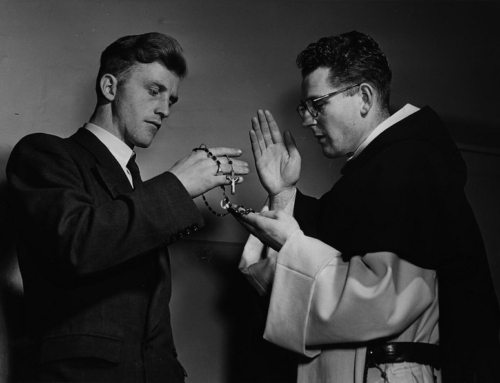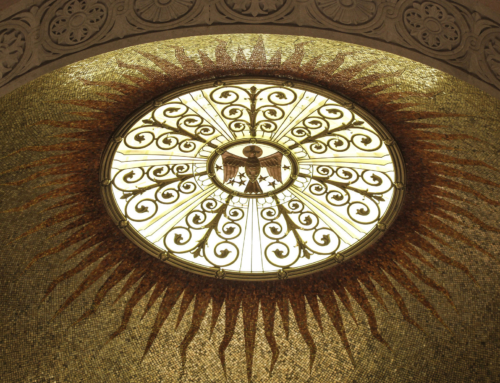Wojciech Giertych, O.P. The Spark of Faith: Understanding the Power of Reaching Out to God. Irondale, Alabama: EWTN Publishing, 2018. 202 pp.
Father Giertych’s short work on supernatural faith is a delight to read. It is a book that is learned without being overly academic, an inspiration to holiness without being saccharine, and eminently practical without belonging to the self-help genre. The book ranges over a variety of subjects arranged in six chapters: Why Faith is Important, Faith and Prayer, Confessional Faith, Reason and Faith, Growth in Faith, and “What About the Unbelievers?” It is not a long read, only 202 pages. In all this, Fr. Giertych has written a book of popular theology that, honing in on a single reality, dispels the clusters of cliches that surround the subject and deepens the devotion of its readers.
Throughout the book, the common thread is St. Thomas Aquinas’s definition of faith, which is two-fold. First, faith is “a habit of mind, whereby eternal life is begun in us,” and, second, that which makes “the intellect assent to what is non-apparent” (Summa Theologiae II-II, q. 4, a. 1). Much of Fr. Giertych’s work is simply fleshing out the implications of this definition. Faith must be understood as a gift of grace from God, “whereby eternal life is begun in us.” It is expressed in a series of statements or propositions that we call the articles of faith. A major theme of the book, especially in the first chapter, is the contention that modern thought is overly concerned with the second half of the definition, the assent of the mind to propositional truths, and ignores the first half, which is essentially mystical. Such an emphasis misses an important aspect of Christian life, for every act of living faith is an encounter with God. Much as the infinite Son of God took on flesh in the Incarnation, the truth of God is made “incarnate” in our minds through faith.
An exclusive emphasis on the propositions of the faith, the author points out, can lead us to hold the faith as something provisional, to the effect of: “I’ll believe this until something better comes along” or “I’m only Catholic until something else makes more sense.” A large source of this problem is due to a confusion of the right relationship between faith and reason; the problem is important, and the author devotes the entire third chapter to it. According to Fr. Giertych, this kind of faith, a faith reduced to an opinion taken on the authority of men, can hardly be sustainable. In order to correct it, we must start by avoiding the temptation to prioritize secondary questions of the discussion over faith and look at faith in its own terms. Instead of prioritizing controversial questions (say, the salvation of unbelievers), he orders the book in such a way that we first deal with the nature of faith itself before going further into more heated topics. This ordering is a reflection of the genius of St. Thomas, who was an expert at keeping the big picture in mind. We deal first with the most real thing (God, who he is in himself), and it is only after dealing with God that we can see everything else in light of him.
By this ordering, Fr. Giertych helps us to see how the whole life of faith is enlivened by God’s gift of grace. In some ways of presenting Christianity, faith appears as the things I have to believe and the rules that I have to follow in order to get the “reward” of heaven (25–27). This approach can make many parts of the faith seem arbitrary, mercenary, or moralistic. Against this moralistic understanding of faith, Fr. Giertych reminds us that faith is a gift, a gift that is valuable in itself and brings us into union with God while we are on earth. When we are baptized, we enter into the life of grace, the life of God, and our own life is fundamentally changed. This re-emphasis on God’s saving work in our lives illuminates the nature of faith by showing us its goal: life with God.
In emphasizing this “given” or “infused” quality of faith, Fr. Giertych does not lapse into obscurity, but gives us pointers toward putting together the two halves of St. Thomas’s definition, which were noted above. How do we move from the life of grace to propositions of the creed which can sometimes seem to be all too human? Fr. Giertych finds a solution in the role of the Church. Faith is something that is put by God into the soul, but the content of the faith is received through our life in the Church. Faith comes by hearing (Rom 10:17), and the divine gift of faith we receive in Baptism normally grows to maturity in receiving the proclamation of Christian truth by other members of the Church. The articles of the faith have been given to us in the creed so that our minds, small as they are, can begin to grasp the mysteries of the faith.
The articles of the creed only make sense in the context of a Church that has God’s authority to teach: “Whatever you bind on earth is bound in heaven, and what you loose on earth is loosed in heaven” (Mt 16:19). Father Giertych, keeping the big picture in mind, asks us to remember that the creed is given to us, not by the authority of men, but by the authority of the self-revealing God (86). The preachers and teachers in the Church are not called to serve themselves, but to be servants of Christ and stewards of the mysteries of God (1 Cor 4:1). Faith reaches its goal, not in providing a curiosity or provoking a controversy, but in leading souls to life with the Holy Trinity. Just as a candle does not light itself but must receive its light as something gratuitous, we must pray that God would increase the light of faith in us and send the spark of faith into the hearts of others throughout the world. In reading The Spark of Faith by Fr. Giertych, we can come to know in a better way the true gratuity of faith, and begin to thank God for his gifts.
Reviewed by Br. Francis Day, O.P.
✠
Download a PDF of this article here



